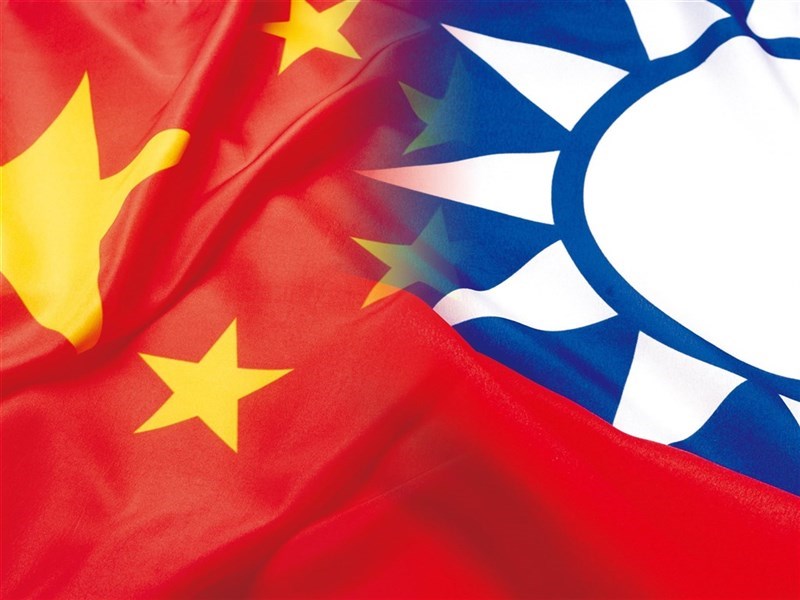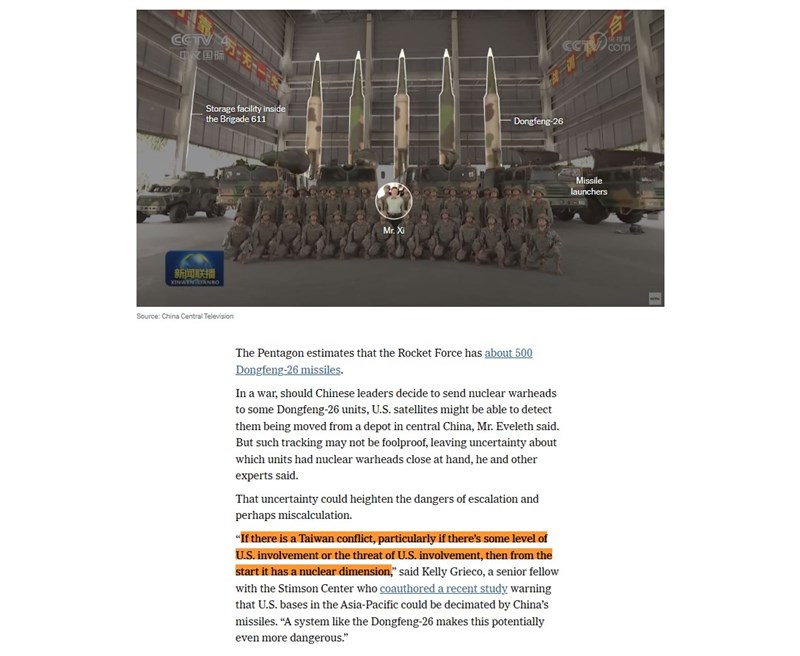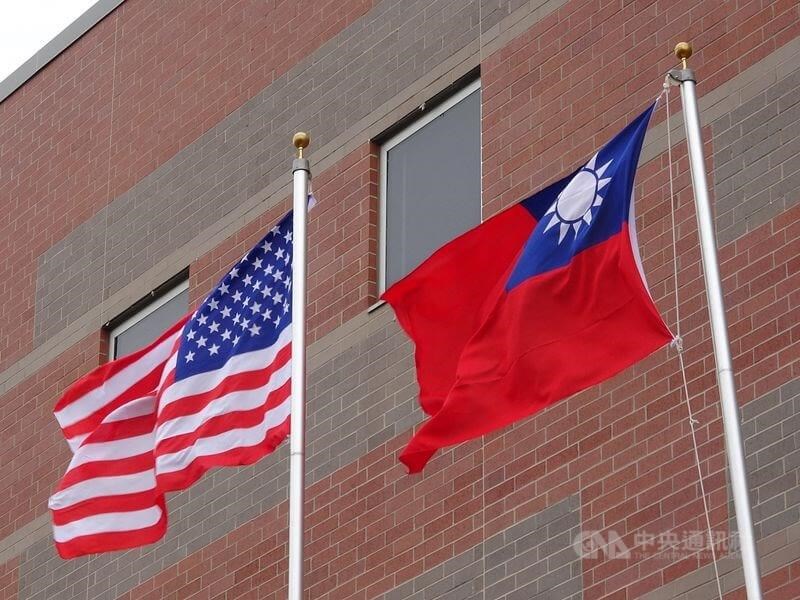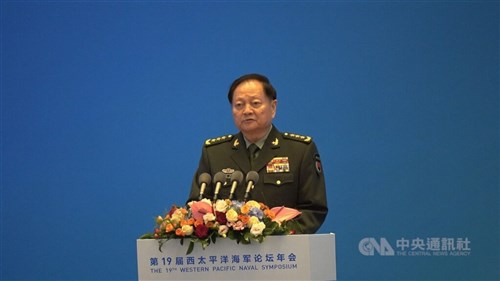ANALYSIS / Growing risk of Chinese 'nuclear blackmail' over Taiwan: Experts

Taipei, Oct. 14 (CNA) China's rapid expansion and diversification of its nuclear arsenal has raised the sobering prospect that Beijing could resort to "nuclear blackmail" or even nuclear warfare against Western nations should they intervene in a conflict over Taiwan -- much like the Kremlin's warnings during its invasion of Ukraine, according to defense experts.
At the Sept. 3 military parade in Beijing’s Tiananmen Square, China unveiled three nuclear-capable missiles — the JL-1 air-launched ballistic missile, the JL-3 submarine-launched intercontinental missile, and the DF-61 surface-to-surface intercontinental missile.
This menacing display of what analysts described as a potential Chinese “nuclear triad” — the ability to launch nuclear weapons from the air, land, and sea — has put democratic nations on alert. Previously, China lacked the capability to conduct airborne nuclear attacks.
Proportionate retaliation

A Sept. 29 report by The New York Times cited Kelly Grieco, a Stimson Center senior fellow, as saying that a conflict in the Taiwan Strait would "have a nuclear dimension," particularly if the United States intervenes or threatens to do so.
The report also highlighted an increase in missile launchers at the People's Liberation Army Rocket Force's 611th Brigade base in Anhui Province, about 700 kilometers from Taiwan, where nuclear-capable Dongfeng-26 (DF-26) missiles have been deployed. The DF-26, with an estimated range of 5,000 kilometers, can reach U.S. air bases on Guam and elsewhere in the Asia-Pacific region.
Eric Heginbotham, a principal research scientist at MIT's Security Studies Program, said China's advanced tactical nuclear weapons, such as the DF-26, provide a "more credible" deterrent than its strategic warheads -- one that Washington might believe Beijing could actually employ in response to a U.S. tactical nuclear strike.
"Not only does it mitigate U.S. escalation dominance in terms of the overall capability, but it also gives [China] more realistic capabilities to retaliate in kind against potential U.S. employment of tactical nuclear weapons," Heginbotham told CNA.
Previously, China's purely strategic retaliatory capability meant that any nuclear response against the U.S. would have been tantamount to a "suicidal" move, he said, as it would invite an overwhelming U.S. counterstrike, causing mass casualties.
"All of this contributes to China's ability to wage conventional war 'safely' -- with less fear of a U.S. nuclear response -- against Taiwan," Heginbotham said.
China could change 'no first use' policy
Asked whether China might act on its nuclear threats if the U.S. intervenes directly in a Taiwan Strait conflict, Shu Hsiao-huang (舒孝煌), an associate research fellow at the Institute for National Defense and Security Research (INDSR), said the possibility could not be ruled out.
He outlined two scenarios in which China could employ nuclear weapons in a regional conflict -- if Beijing felt cornered or if the U.S. used nuclear weapons first.
"As China expands and diversifies its nuclear arsenal and strengthens its strike capabilities, its theater commanders will have more options when using force. That could lead to changes in its 'no first use' nuclear policy," Shu said, referring to China's long-standing stance on the use of nuclear weapons, which it has maintained since 1964.
According to the U.S. Department of Defense's 2024 report on China's military power, Beijing had more than 600 operational nuclear warheads as of last year and is projected to possess over 1,000 by 2030.
Another factor that could influence China's decision to use nuclear weapons is its confidence in its homeland's defenses against nuclear retaliation, Shu said.
"When two adversaries have equally sharp spears, the one with the stronger shield will strike first," he said.
Citing the U.S.' planned "Golden Dome" multilayered missile defense system -- designed to intercept and destroy ballistic, hypersonic, and cruise missiles -- Shu said that if completed, the system could protect the U.S. homeland against Chinese nuclear attacks and limit Beijing's ability to engage in nuclear coercion.
New uncertainties to U.S. aid
Yang Tai-yuan (楊太源), chairman of the Secure Taiwan Associate Corporation, warned that such developments might make the U.S. more hesitant to send troops to defend Taiwan in the event of a Chinese invasion.
"The Chinese Communist Party likely learned nuclear blackmail from Russia during the war in Ukraine and could threaten to use tactical nuclear weapons against major powers that intervene in its regional conflicts, including the Taiwan Strait," Yang said.
In the event the U.S. sends troops to help defend Taiwan, China could use its tactical nuclear warheads to threaten American forces stationed in the western Pacific, he said.
"The U.S. would likely take that threat seriously and weigh its options between sending troops to the Taiwan Strait or limiting its response to diplomatic measures -- such as expressing solidarity through the United Nations -- to avoid direct confrontation," he added.
"We need to think seriously and assume that if conflict breaks out, we must be prepared to defend ourselves independently," Yang said. "What should we strengthen? What should we prepare? Those are the questions we must confront -- rather than simply hoping the United States will come to our aid."
-
![Iran could cloud Trump-Xi talks but unlikely to spark Taiwan war: Scholars]() Iran could cloud Trump-Xi talks but unlikely to spark Taiwan war: ScholarsEscalating conflict in the Middle East is unlikely to trigger an immediate cross-strait crisis or directly imperil Taiwan in U.S.-China dealings, but it could pose growing risks by straining U.S. resources and complicating the upcoming Trump-Xi meeting, scholars said.03/02/2026 06:13 PM
Iran could cloud Trump-Xi talks but unlikely to spark Taiwan war: ScholarsEscalating conflict in the Middle East is unlikely to trigger an immediate cross-strait crisis or directly imperil Taiwan in U.S.-China dealings, but it could pose growing risks by straining U.S. resources and complicating the upcoming Trump-Xi meeting, scholars said.03/02/2026 06:13 PM -
![U.S. policy unchanged despite Taiwan omission in defense strategy: Analysts]() U.S. policy unchanged despite Taiwan omission in defense strategy: AnalystsThe absence of Taiwan in the Pentagon's recently released 2026 National Defense Strategy (NDS) has raised concerns about the United States' commitment to the island nation's defense.02/07/2026 04:31 PM
U.S. policy unchanged despite Taiwan omission in defense strategy: AnalystsThe absence of Taiwan in the Pentagon's recently released 2026 National Defense Strategy (NDS) has raised concerns about the United States' commitment to the island nation's defense.02/07/2026 04:31 PM -
![Xi's military purge raises Taiwan miscalculation risk: Experts]() Xi's military purge raises Taiwan miscalculation risk: ExpertsChinese President Xi Jinping's (習近平) ongoing purge of senior military leaders, most recently targeting top general Zhang Youxia (張又俠), could help him consolidate power and potentially increase the risk of strategic miscalculation over Taiwan, according to experts.01/27/2026 09:31 PM
Xi's military purge raises Taiwan miscalculation risk: ExpertsChinese President Xi Jinping's (習近平) ongoing purge of senior military leaders, most recently targeting top general Zhang Youxia (張又俠), could help him consolidate power and potentially increase the risk of strategic miscalculation over Taiwan, according to experts.01/27/2026 09:31 PM
-
Business
Taiwan's consumer confidence weakens slightly in February
03/03/2026 11:07 AM -
Business
U.S. dollar higher in Taipei trading
03/03/2026 10:42 AM -
Culture
Mandopop singer Sun Yanzi to perform at Taipei Dome in May
03/03/2026 10:22 AM -
Society
Heavy rain advisory in effect for Nantou County
03/03/2026 10:16 AM -
Society
Taiwan headline news
03/03/2026 09:57 AM


